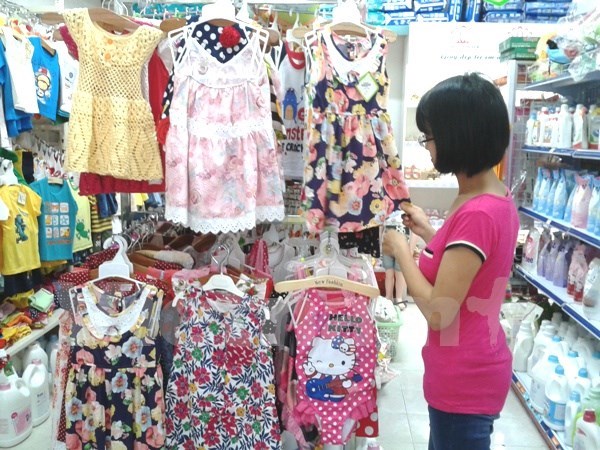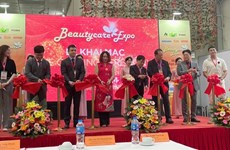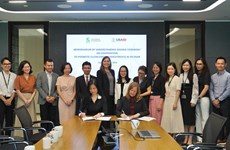Quality key for retail goods, hears seminar
Vietnamese producers of consumer goods should invest more in improving product quality and develop close links among themselves to negotiate better with foreign-owned retailers, a seminar heard.
 A consumer selects kids' clothing (Photo: VNA)
A consumer selects kids' clothing (Photo: VNA)HCM City (VNA) - Vietnamese producers of consumer goods should invest more in improving product quality and develop close links among themselves to negotiate better with foreign-owned retailers, a seminar heard in HCM City on June 3.
Pham Ngoc Hung, deputy chairman of the HCM City Union of Business Associations (HUBA), said recently many producers have complained that they are struggling to sell to foreign-owned supermarkets mainly because the latter demand excessive discounts.
“Many businesses said they do not earn profits, even make losses from selling their products to supermarkets, but still strive to distribute their products through supermarket to sustain their brands.”
Local retailers have also suffered from the massive influx of foreign retailers, who now control more than 50 percent of the retail market, he said.
Le Thanh Lam, deputy general director of Saigon Food, said though the supermarket network has expanded rapidly in recent years, it remains inadequate compared to businesses’ need to take their products to the market.
“If one business wants to withdraw its products from a supermarket’s shelves, many others queue up to offer theirs, leading to a lopsided relationship.”
Local retailers ask producers for a discount of up to 10 percent, but it is 10-30 percent at foreign supermarkets, she said.
The lack of close links among local firms and their lack of experience in negotiating with foreign retailers always put them at a disadvantage to foreign supermarkets, she said.
Nguyen Phu Chien, general director of Bibica, said foreign supermarkets refuse to accept any changes in contracts with businesses, while the cost of transporting products are increasing relentlessly.
Chien, Lam and others at the seminar agreed that local producers should join hands to negotiate with foreign retailers.
Nguyen Ngoc Hoa, deputy chairman of the city Department of Industry and Trade, said producers should invest more in technology to make quality products with unique features that satisfy customers’ needs.
“If your products are good, customers will seek your products when they go to supermarkets, and no retailer will dare to refuse your products.”
He said businesses should be more dynamic in expanding both traditional and modern distribution networks, especially in rural areas.
Hung said that with its population of 90 million, of whom 60 percent are young consumers, and modern trade channels accounting for just for 25 percent of retail business, the country is an attractive retail market for foreign investors.
A lot of foreign retailers have entered the domestic market, he said.
Meanwhile, imports from countries like Japan, Malaysia, the Republic of Korea, and Thailand are becoming more and more popular, threatening local producers, he said.
If the country does not have a suitable strategy for the retail market, it would be dominated by foreign investors, he said.
Foreign retailers in Vietnam are obliged to go through an “economic needs test” before they are allowed to open a new store larger than 500 square meters. But in most places authorities have not implemented it well.
Hoa said the ENT would not slow down the entry of foreign retailers since they have other ways like mergers and acquisitions to penetrate the Vietnamese market.
The Government should intensify checks to crack down on unfair business practices in the retail market, quickly make a development scheme to develop the retail system, help local businesses find sites to expand their distribution networks and invest in improving their technologies, he said.-VNA













